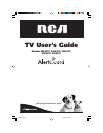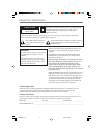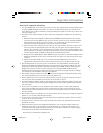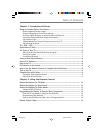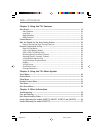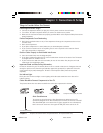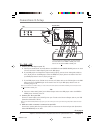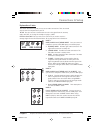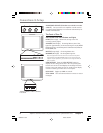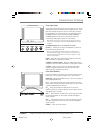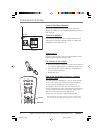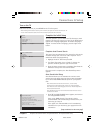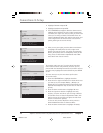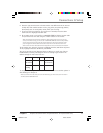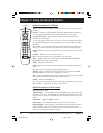
Alert Guard™ Important Information
• The green READY light on the front panel of the TV is the main indicator that the Alert Guard system
is receiving NWR broadcast information. If it's not lit, the Alert Guard system can’t inform you of
alerts. During poor reception conditions, the Alert Guard system might not inform you of alerts even
if the green light is on.
• Generally, the Alert Guard system can fail to notify you of dangerous conditions for the following
reasons:
1. National Oceanic and Atmospheric Administration (NOAA) did not broadcast an alert. Certain
criteria must be met for NOAA to issue an alert, and only certain events are reported by NOAA.
While weather forecasting continues to improve, it is not perfectly accurate. For this reason,
situations that might be dangerous to you may be unknown to NOAA.
2. Power was lost to the TV during the time when an alert was broadcast. If power is lost for more
than 15 seconds, the Alert Guard system will notify you that power was interrupted the next
time the TV is turned on. Any alerts issued during a power failure won't be acknowledged by the
Alert Guard system. Therefore, you might want to purchase a battery operated alert radio or have
a battery powered radio available for listening when household power fails.
3. Reception of the NOAA Weather Radio (NWR) was poor at the time an alert was broadcast. Since
NOAA only broadcasts an alert once, momentary loss of reception can prevent alerts from being
received.
4. Options in the Alert Guard menu, such as locations and the NWR channel, were not set
appropriately. Instructions within the User's Guide will help you set up Alert Guard correctly.
• Alert Guard shouldn't be your only source of information. You should always maintain personal,
family, and neighborhood safeguard systems, and remain aware of changing conditions. The Alert
Guard system relays alerts based on information provided by the NWR. The Alert Guard system is
designed to recognize all alerts currently issued over the all hazards NWR broadcast system.
Incidents (such as local traffic accidents and weather related school closings) that don't endanger
the community with immediate threats are
not broadcast.
• Alert Guard coverage is limited to the U.S., U.S. territories, possessions and associated states, within
your local geographic area. These areas are listed on pages 37-54.
• While it appears you can set up the Alert Guard system to receive alerts from across the country, it
can only receive alerts broadcast for areas close to the location of the TV.
• For models 20F671T, 24F671T, 27V571T, and 27F671T, don’t leave headphones plugged in when they
aren’t in use. Alarms will sound through the headphones and not the TV’s speakers, causing alarms
not to be heard.
• If your TV is connected to a receiver, amplifier, home theater system, or other audio equipment,
alerts won’t be audible through such devices connected to the audio output terminals of the TV;
instead, the Alert Guard system will turn on the TV’s internal speakers to sound an alarm and make
the alerts audible.
• Non-weather emergency messages, such as chemical spills, nuclear power plant emergencies, gas line
breaks, etc., are not fully implemented nationally.
• If you receive an alert that tells you to seek shelter, do so immediately and don't continue to listen
for other alerts until you are safe.
• It might take time, and after you've received several alerts, before you understand how the Alert
Guard feature works.
• While government agencies use sophisticated equipment, such as weather models, radars, and
satellites to determine an alert’s effective time and duration, the end of an alert also does not
necessarily mean that related emergency events are over. Weather conditions can change rapidly,
and caution should be taken before and after alerts.
Important Information
Alert Guard is a trademark of Thomson Inc.
16356860 Cover 4/28/04, 9:53 AM3



